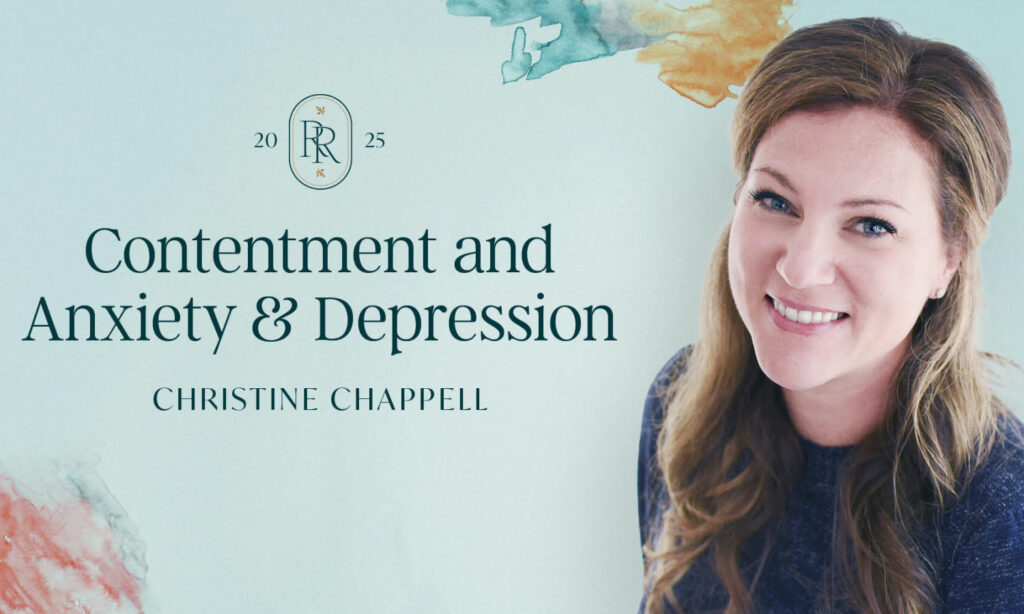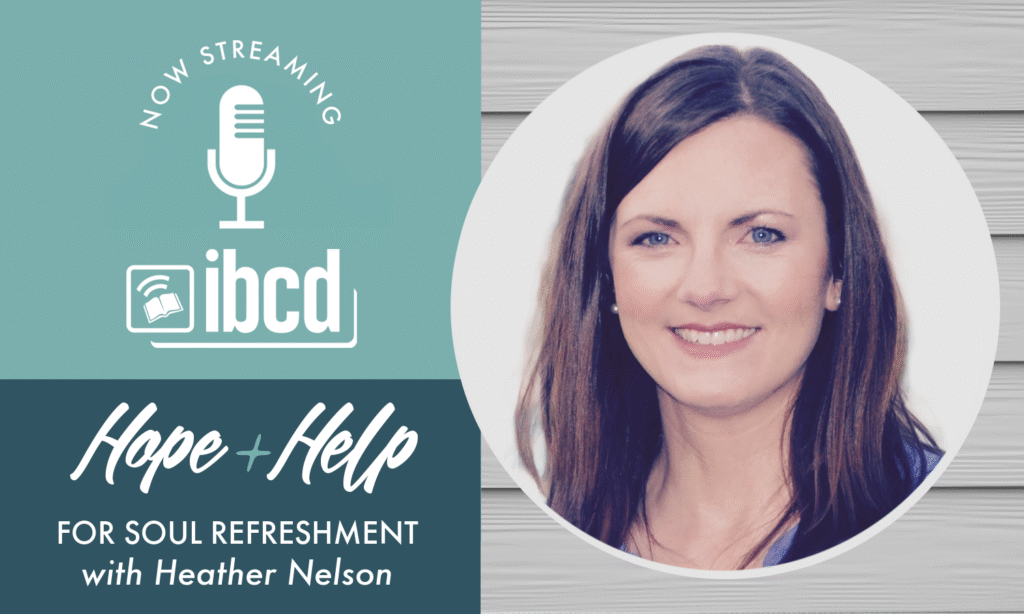If your teen is battling depression, you may be feeling helpless and hopeless. Perhaps you’re slowly coming to the realization that you have no idea how to rescue your child from the darkness he or she is in.
Christine Chappell knows from experience that there are no quick and easy solutions, but here she provides biblical wisdom and encouragement to offer hope for the hopeless teen and help for the helpless caregiver.
Available in paperback and eBook format.


Help! My Teen is Depressed
Mini-Book Resource for Parents, Caregivers, Student Pastors, and Counselors
The distress of our child’s depression was a tribulation my husband and I never imagined for our family. That our child would suffer in ways unseen, through caverns of mental turmoil, beneath the weight of a darkness we cannot lift; that we would find ourselves in this place without warning — unexpectedly, surprisingly, confusingly. We weren’t prepared.
A child’s depression may feel like his own isolating burden, but make no mistake: the shock waves unsettle every branch of the living family tree. One cannot parent a child through depression and walk away unscathed, unchallenged, or unsympathetic to the plight of fellow families who cry, “O Lord, that we would find ourselves in this place and know not what to do!”
We found ourselves frantically crying out to God, mimicking the urgency of King Jehoshaphat’s distress: “We are powerless against this great horde that is coming against us. We do not know what to do, but our eyes are on you” (2 Chronicles 20:12).
We do not know what to do, but our eyes are on you.
A child’s depression may feel like his own isolating burden, but make no mistake: the shock waves unsettle every branch of the living family tree. One cannot parent a child through depression and walk away unscathed, unchallenged, or unsympathetic to the plight of fellow families who cry, “O Lord, that we would find ourselves in this place and know not what to do!”
We found ourselves frantically crying out to God, mimicking the urgency of King Jehoshaphat’s distress: “We are powerless against this great horde that is coming against us. We do not know what to do, but our eyes are on you” (2 Chronicles 20:12).
We do not know what to do, but our eyes are on you.
As Christians, we do well to consider God’s wise ways when constructing a holistic approach to parenting through depression.
Master's Care
In his sermon “Elijah Fainting,” Charles Spurgeon observed, “It is always well for ministers, and all who have the care of souls, to watch how God deals with those who are in trouble, just as a young surgeon, when he walks the hospital, is eager to see how a master in the healing art treats his patients.”
As we have sought to help our child navigate this tumultuous season of life, we’ve found our bearings by observing God’s masterful care of his wounded ones. As Christians, we do well to consider God’s wise ways when constructing a holistic approach to parenting through depression.
1. Do not overlook physiological well-being. When Elijah’s fear of Jezebel’s death threats overtook his faculties, he retreated to the wilderness and, in despair, asked God to take away his life (1 Kings 19:4). God immediately responded by letting him rest, receive nourishment, and be nursed (1 Kings 19:5–8). Urgent attention to Elijah’s physical body, God determined, could not be ignored — and neither should it be with children experiencing depression. This may mean physical examinations and laboratory tests are prudent, depending on the medical opinion of the family’s licensed practitioner. In some cases, where self-harm or suicidal ideations (or both) are acute, emergency services may be appropriate to ensure the child’s physical safety.
2. Do not overlook spiritual well-being. When God extended mercy toward the repentant Ninevites, anger consumed Jonah’s heart, and he asked God to “take my life from me” (Jonah 4:3). God addressed Jonah’s distress through ongoing dialogue, using conversation to dive deeper into the heart of his despair (Jonah 4:4–11). We’ve personally observed our child’s countenance lift, if only temporarily, when our conversations allow depression to have a voice. By asking reflective questions, parents acknowledge their children’s experience while helping them slowly peel back the layers of their sorrow. Psalms of lament, like Psalm 88, can equip our children with a language to vocalize their spiritual pain to God (instead of against him). Equally as important, they also give the sufferer permission to bring their “Why?” questions before him (Psalm 88:14). For more help to nourish your child’s spiritual well-being, you can find equipping resources on depression from trusted biblical counseling organizations, such as the Association of Certified Biblical Counselors, the Christian Counseling and Education Foundation, and the Institute of Biblical Counseling and Discipleship.
3. Incorporate wise biblical counselors. When the relentless complaining of the Israelites finally whittled Moses down to an overburdened stump, his spirit broke, and he grilled the Lord about the burden on his shoulders (Numbers 11:11–15). “Kill me at once,” he told God, in order to be spared the stress of leading the nation (Numbers 11:15). On this occasion, God’s reply didn’t directly address a physical or spiritual need; instead, he provided crisis management help: Moses was told to gather seventy respected elders from the people in order to share the burden (Numbers 11:16–17). As God granted Moses elders to help oversee the people, we too can support our children by enlisting gospel-centered, Bible-believing counselors to disciple them through recovery. If your child is experiencing social isolation, feeling hopelessness, displaying inclinations to self-harm, or suffering a depressed mood without improvement for two weeks, it may be time to contact your local church for potential in-house resources, biblical counselor referrals, or both.
4. Incorporate biblical community. Look to the sorrows of Christ the night before he died. In Luke’s account, we’re told of Jesus’s spirit being so taxed that he was sweating drops of blood (Luke 22:44) — a condition called hematidrosis, which occurs only under conditions of extreme emotional distress. The Father offered his paternal care to Christ by sending an angel from heaven to strengthen him for the journey to Calvary (Luke 22:43). Despondent children also need consolations to take courage and trust God for their future, and one of the main ways we can access this heavenly strengthening is through fellowship in biblical community. Our family found tremendous relief in collaborating with our child’s student-group leaders. By creating a plan for our child to take small steps toward manageable social situations, we were able to support an eventual reintegration into the body of Christ for fellowship. We’ve also been blessed by our small group’s offers of support through prayer request management, meal trains, encouragement cards, and coordinated yet low-pressure family outings.
As we have sought to help our child navigate this tumultuous season of life, we’ve found our bearings by observing God’s masterful care of his wounded ones. As Christians, we do well to consider God’s wise ways when constructing a holistic approach to parenting through depression.
1. Do not overlook physiological well-being. When Elijah’s fear of Jezebel’s death threats overtook his faculties, he retreated to the wilderness and, in despair, asked God to take away his life (1 Kings 19:4). God immediately responded by letting him rest, receive nourishment, and be nursed (1 Kings 19:5–8). Urgent attention to Elijah’s physical body, God determined, could not be ignored — and neither should it be with children experiencing depression. This may mean physical examinations and laboratory tests are prudent, depending on the medical opinion of the family’s licensed practitioner. In some cases, where self-harm or suicidal ideations (or both) are acute, emergency services may be appropriate to ensure the child’s physical safety.
2. Do not overlook spiritual well-being. When God extended mercy toward the repentant Ninevites, anger consumed Jonah’s heart, and he asked God to “take my life from me” (Jonah 4:3). God addressed Jonah’s distress through ongoing dialogue, using conversation to dive deeper into the heart of his despair (Jonah 4:4–11). We’ve personally observed our child’s countenance lift, if only temporarily, when our conversations allow depression to have a voice. By asking reflective questions, parents acknowledge their children’s experience while helping them slowly peel back the layers of their sorrow. Psalms of lament, like Psalm 88, can equip our children with a language to vocalize their spiritual pain to God (instead of against him). Equally as important, they also give the sufferer permission to bring their “Why?” questions before him (Psalm 88:14). For more help to nourish your child’s spiritual well-being, you can find equipping resources on depression from trusted biblical counseling organizations, such as the Association of Certified Biblical Counselors, the Christian Counseling and Education Foundation, and the Institute of Biblical Counseling and Discipleship.
3. Incorporate wise biblical counselors. When the relentless complaining of the Israelites finally whittled Moses down to an overburdened stump, his spirit broke, and he grilled the Lord about the burden on his shoulders (Numbers 11:11–15). “Kill me at once,” he told God, in order to be spared the stress of leading the nation (Numbers 11:15). On this occasion, God’s reply didn’t directly address a physical or spiritual need; instead, he provided crisis management help: Moses was told to gather seventy respected elders from the people in order to share the burden (Numbers 11:16–17). As God granted Moses elders to help oversee the people, we too can support our children by enlisting gospel-centered, Bible-believing counselors to disciple them through recovery. If your child is experiencing social isolation, feeling hopelessness, displaying inclinations to self-harm, or suffering a depressed mood without improvement for two weeks, it may be time to contact your local church for potential in-house resources, biblical counselor referrals, or both.
4. Incorporate biblical community. Look to the sorrows of Christ the night before he died. In Luke’s account, we’re told of Jesus’s spirit being so taxed that he was sweating drops of blood (Luke 22:44) — a condition called hematidrosis, which occurs only under conditions of extreme emotional distress. The Father offered his paternal care to Christ by sending an angel from heaven to strengthen him for the journey to Calvary (Luke 22:43). Despondent children also need consolations to take courage and trust God for their future, and one of the main ways we can access this heavenly strengthening is through fellowship in biblical community. Our family found tremendous relief in collaborating with our child’s student-group leaders. By creating a plan for our child to take small steps toward manageable social situations, we were able to support an eventual reintegration into the body of Christ for fellowship. We’ve also been blessed by our small group’s offers of support through prayer request management, meal trains, encouragement cards, and coordinated yet low-pressure family outings.
Remember that you are not called to “fix” your child’s depression, but you are called to love, encourage, and disciple him through it.
No Quick Fixes
Our family is months into the recovery process and still just inching along in terms of progress. Because there are no quick fixes for despondent children, we must guard our hearts against trading initial compassion for impatient bitterness. This journey will test your ability to love as humbly and faithfully as Christ has loved you (Ephesians 5:1–2). Remember that you are not called to “fix” your child’s depression, but you are called to love, encourage, and disciple him through it (1 Thessalonians 5:14).
Mental health issues can be complex in nature, and parents can run the risk of overlooking particular facets of treatment because of prejudices about underlying causes. But when we look to the Scriptures and see God serving the sorrowing with individualized, calculated affection, we see a multifaceted approach to managing mental anguish — one that acknowledges the dichotomy of man (as body and soul) and the necessity of the body of Christ.
As we pray for the grace to emulate God’s care, we will be emboldened to answer a hard calling with hope: “O Lord, that we would find ourselves in this place and know we’re not powerless to help!”
Mental health issues can be complex in nature, and parents can run the risk of overlooking particular facets of treatment because of prejudices about underlying causes. But when we look to the Scriptures and see God serving the sorrowing with individualized, calculated affection, we see a multifaceted approach to managing mental anguish — one that acknowledges the dichotomy of man (as body and soul) and the necessity of the body of Christ.
As we pray for the grace to emulate God’s care, we will be emboldened to answer a hard calling with hope: “O Lord, that we would find ourselves in this place and know we’re not powerless to help!”
This article originally appeared at Desiring God, published on May 2nd, 2019. Click here to view the original post.

Christine M. Chappell
Author/Writer/Speaker/Podcast Host
Christine is the author of Clean Home, Messy Heart and Help! My Teen is Depressed. She hosts IBCD's Hope + Help Podcast and is passionate about advocating for biblical one-another care and discipleship in the context of the local church. Her writing has been featured at Desiring God, The Gospel Coalition, Risen Motherhood, Servants of Grace, and other Christian platforms. Christine blogs regularly at christinemchappell.com and lives in South Carolina with her husband and three children.
Click to learn more about my weekly biblical resource deliveries.
Every week, a different topic. Carefully curated Christ-centered resources designed to equip you to face life's spiritual challenges with courage and clarity.
Helpful for sufferers, strugglers, and supporters alike.
Click the picture to the left, or the mail icon above to learn more about my weekly deliveries.
Or, if you know you want to receive them already–complete the form below.

























